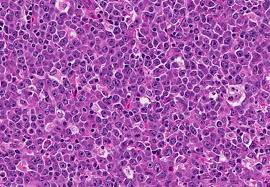27 April 2023 | Thursday | Regulatory

Image Source|Public Domain
Roche (SIX: RO, ROG; OTCQX: RHHBY) announced that the European Medicines Agency’s Committee for Medicinal Products for Human Use (CHMP) has recommended the approval of Columvi® (glofitamab), for the treatment of adult patients with relapsed or refractory (R/R) diffuse large B-cell lymphoma (DLBCL) after two or more lines of systemic therapy. Columvi has the potential to change the current standard of care in DLBCL. As well as inducing early and long-lasting responses in people with heavily pre-treated or refractory DLBCL, potentially allowing patients a treatment free period, Columvi is designed to be given for a fixed period of time so that people know when their treatment will end. It is also an off-the-shelf therapy, meaning that people do not have to wait for cell collection and genetic engineering before starting treatment, which could be particularly important for patients who are at a high-risk of their disease progressing. A final decision is expected from the European Commission (EC) in the near future.
“New therapeutic options that are readily and broadly available are urgently needed for people with relapsing diffuse large B-cell lymphoma, which can become fatal without immediate treatment,” said Levi Garraway, M.D., Ph.D., Roche’s Chief Medical Officer and Head of Global Product Development. “The CHMP’s recommendation for Columvi brings us closer to providing a new, fixed-duration therapy for people with diffuse large B-cell lymphoma that induces early and long-lasting responses.”
DLBCL is an aggressive (fast-growing) type of lymphoma and is one of the most prevalent types of blood cancer among adults.2 Each year in Europe, an estimated 36,000 people are diagnosed with DLBCL.3 While many people with DLBCL are responsive to initial treatment, four out of ten are not cured with the current frontline standard of care, and the majority of those who require subsequent lines of therapy have poor outcomes.4,5 Once approved, fixed-duration Columvi will be the first CD20xCD3 T-cell-engaging bispecific antibody available to treat people in Europe with this aggressive type of lymphoma following multiple prior lines of therapy.
The CHMP recommendation is based on positive results from a pivotal cohort in the phase I/II NP30179 study, where Columvi given as a fixed-course induced early and long-lasting responses in people with R/R DLBCL. Overall, 83.3% of patients were refractory to their most recent therapy, 90% were refractory to any previous line of therapy, and about one-third (35.2%) had received prior CAR T-cell therapy. Results showed that Columvi given as a fixed course induced a complete response (CR; a disappearance of all signs of cancer) in 35.2%
(n =38/108) of people and 50% (n=54/108) achieved an overall response (OR; the combination of CR and partial response, a decrease in the amount of cancer in their body). Among those who achieved a CR, 74.6% (95% CI: 59.19-89.93) continued to experience a response at 12 months, while the median duration of CR was not reached. The median follow-up for duration of response (DOR) was 12.8 months. Median time to first CR was 42 days (95% CI: 41-47). The most common adverse events (AEs) were cytokine release syndrome (CRS; 64.3%), neutropenia (a reduction in white blood cells [37.7%]), anaemia (30.5%) and thrombocytopenia (low blood platelet count [24.7%]). CRS was generally low grade (Grade 1: 48.1%; Grade 2: 12.3%). One patient discontinued treatment due to CRS.1
Additional data from a larger cohort in the NP30179 study, published in the New England Journal of Medicine, reinforce the durability of Columvi. Fixed-duration Columvi resulted in early and long-lasting responses in people with heavily pre-treated or refractory DLBCL, with 39.4% of patients (n=61/155) achieving a CR and a median DOR of 18.4 months. Median time to first CR was 42 days (95% CI: 42-44), with the majority of responses reported at the first scheduled response assessment (approximately 1.4 months after the start of treatment). Half of patients (51.6%; n=80/155) achieved an OR. The most common AE was CRS, which was generally low grade (Grade 1: 47.4%; Grade 2: 11.7%) and occurred at initial doses. Columvi-related AEs leading to treatment discontinuation occurred in 3.2% of patients.6
Columvi was recently approved by Health Canada for the treatment of adult patients with R/R DLBCL not otherwise specified, DLBCL arising from follicular lymphoma, or primary mediastinal B-cell lymphoma, who have received two or more lines of systemic therapy and are ineligible to receive or cannot receive CAR T-cell therapy or have previously received CAR T-cell therapy. Additionally, the U.S. Food and Drug Administration (FDA) accepted Genentech’s Biologics License Application and granted priority review for glofitamab for the treatment of people with R/R large B-cell lymphoma. The U.S. FDA is expected to make a decision on approval by 1 July 2023. Submissions to additional health authorities worldwide are ongoing.
Columvi is part of Roche’s broad and industry-leading CD20xCD3 T-cell-engaging bispecific antibody clinical development programme. Roche’s portfolio also includes Lunsumio® (mosunetuzumab), which was granted accelerated approval by the U.S. FDA in December 2022 and conditional marketing authorisation by the EC in June 2022 for the treatment of adult patients with R/R follicular lymphoma after two or more lines of systemic therapy.
In an effort to help more patients in need of new treatment options, Roche continues to expand Columvi’s clinical development programme, which includes the phase III STARGLO trial, evaluating Columvi in combination with gemcitabine and oxaliplatin (GemOx) versus rituximab in combination with GemOx in people with second-line plus DLBCL who are ineligible for autologous stem cell transplant. Additional phase III studies are also planned, including in first-line DLBCL.
© 2026 Biopharma Boardroom. All Rights Reserved.